Judgments of Learning Reactively Improve Memory by Enhancing Learning Engagement and Inducing Elaborative Processing: Evidence from an EEG Study
Abstract
1. Introduction
1.1. Reactivity Effect
1.2. Putative Mechanisms
1.3. Cognitive Neural Indicators Associated with the Reactivity Effect
1.4. The Current Study
2. Method
2.1. Participants
2.2. Materials
2.3. Procedure
2.4. Behavioral Data Analyses
2.5. EEG Recording and Preprocessing
2.6. ERP Data Analyses
2.7. Time Frequency Analyses
2.8. Mediation Analyses
3. Results
3.1. Behavioral Results
3.2. ERP Results
3.2.1. Results of Cluster Analyses
3.2.2. Results of Mediation Analyses
3.3. Time-Frequency Results
3.3.1. Results of Cluster Analyses
3.3.2. Results of Mediation Analyses
4. Discussion
5. Limitations
6. Conclusions
Author Contributions
Funding
Institutional Review Board Statement
Informed Consent Statement
Data Availability Statement
Conflicts of Interest
Appendix A
| 1 | In the current study, d′ was calculated as the signed difference between Z-transformed hit rate and Z-transformed false alarm rate (Banks 1970; Stanislaw and Todorov 1999). |
References
- Banks, William P. 1970. Signal detection theory and human memory. Psychological Bulletin 74: 81–99. [Google Scholar] [CrossRef]
- Bao, Han-Wu-Shuang. 2023. Broadly Useful Convenient and Efficient R Functions (Version 2023.9). Available online: https://CRAN.R-project.org/package=bruceR (accessed on 27 September 2023).
- Beato, Maria Soledad, Angela Boldini, and Sadavid Cadavid. 2012. False memory and level of processing effect: An event-related potential study. Neuroreport 23: 804–8. [Google Scholar] [CrossRef]
- Bowman, Anthony D., Joseph C. Griffis, Kristina M. Visscher, Allan C. Dobbins, Timothy J. Gawne, Mark W. DiFrancesco, and Jerzy P. Szaflarski. 2017. Relationship between alpha rhythm and the default mode network: An EEG-fMRI study. Journal of Clinical Neurophysiology 34: 527–33. [Google Scholar] [CrossRef]
- Cai, Qing, and Marc Brysbaert. 2010. SUBTLEX-CH: Chinese word and character frequencies based on film subtitles. PLoS ONE 5: e10729. [Google Scholar] [CrossRef]
- Carreiras, Manuel, Marta Vergara, and Horacio Barber. 2005. Early event-related potential effects of syllabic processing during visual word recognition. Journal of Cognitive Neuroscience 17: 1803–17. [Google Scholar] [CrossRef] [PubMed]
- Chang, Mingyu, and Charles Brainerd. 2024. Judgments of learning reactivity on item-specific and relational processing. Journal of Intelligence 12: 4. [Google Scholar] [CrossRef]
- Chen, Lingli, and Ling Li. 2013. Context modulates neural activity of N400 and P600 to visual words. Journal of Neurolinguistics 26: 490–509. [Google Scholar] [CrossRef]
- Clancy, Kevin J., Jeremy A. Andrzejewski, Yuqi You, Jens T. Rosenberg, Mingzhou Ding, and Wen Li. 2022. Transcranial stimulation of alpha oscillations up-regulates the default mode network. Proceedings of the National Academy of Sciences of the United States of America 119: e2110868119. [Google Scholar] [CrossRef] [PubMed]
- De Grauwe, Sophie, Abigail Swain, Phillip J. Holcomb, Tali Ditman, and Gina R. Kuperberg. 2010. Electrophysiological insights into the processing of nominal metaphors. Neuropsychologia 48: 1965–84. [Google Scholar] [CrossRef]
- Delorme, Arnaud, and Scott Makeig. 2004. EEGLAB: An open source toolbox for analysis of single-trial EEG dynamics including independent component analysis. Journal of Neuroscience Methods 134: 9–21. [Google Scholar] [CrossRef]
- Double, Kit S., and Damian P. Birney. 2019. Reactivity to measures of metacognition. Frontiers in Psychology 10: 27–55. [Google Scholar] [CrossRef] [PubMed]
- Double, Kit S., Damian P. Birney, and Sarah A. Walker. 2018. A meta-analysis and systematic review of reactivity to judgements of learning. Memory 26: 741–50. [Google Scholar] [CrossRef] [PubMed]
- Dunlosky, John, and Christopher Hertzog. 1997. Older and younger adults use a functionally identical algorithm to select items for restudy during multitrial learning. The Journals of Gerontology Series B: Psychological Sciences and Social Sciences 52: 178–86. [Google Scholar] [CrossRef]
- Dunlosky, John, and Keith W. Thiede. 2004. Causes and constraints of the shift-to-easier-materials effect in the control of study. Memory & Cognition 32: 779–88. [Google Scholar] [CrossRef]
- Einstein, Gillies O., and Mark A. McDaniel. 1997. Aging and mind wandering: Reduced inhibition in older adults? Experimental Aging Research 23: 343–54. [Google Scholar] [CrossRef]
- Faul, Franz, Edgar Erdfelder, Albert-Georg Lang, and Axel Buchner. 2007. G*Power 3: A flexible statistical power analysis program for the social, behavioral, and biomedical sciences. Behavior Research Methods 39: 175–91. [Google Scholar] [CrossRef]
- Finn, Bridgid. 2008. Framing effects on metacognitive monitoring and control. Memory & Cognition 36: 813–21. [Google Scholar] [CrossRef]
- Fortin, Julie, Simon Grondin, and Sophie Blanchet. 2021. Event-related potentials of episodic encoding after traumatic brain injury in older adults. Brain Research 1766: 147504. [Google Scholar] [CrossRef]
- Gan, Tian, Wei Fang, and Liezhong Ge. 2016. Colours’ impact on morality: Evidence from event-related potentials. Scientific Reports 6: 38373. [Google Scholar] [CrossRef]
- Guran, Catherine-Noémie Alexandrina, Nora Alicia Herweg, and Nico Bunzeck. 2019. Age-related decreases in the retrieval practice effect directly relate to changes in alpha-beta oscillations. The Journal of Neuroscience 39: 4344–52. [Google Scholar] [CrossRef]
- Hanslmayr, Simon, Bernhard Spitzer, and Karl-Heinz Bäuml. 2008. Brain oscillations dissociate between semantic and nonsemantic encoding of episodic memories. Cerebral Cortex 19: 1631–40. [Google Scholar] [CrossRef] [PubMed]
- Hanslmayr, Simon, Gregor Volberg, Maria Wimber, Makus Raabe, Mark W. Greenlee, and Karl-Heinz T. Bäuml. 2011. The relationship between brain oscillations and BOLD signal during memory formation: A combined EEG-fMRI study. The Journal of Neuroscience 31: 15674–80. [Google Scholar] [CrossRef] [PubMed]
- Hoechstetter, Karsten, Harald Bornfleth, Dieter Weckesser, Nicole Ille, Patrick Berg, and Michael Scherg. 2004. BESA source coherence: A new method to study cortical oscillatory coupling. Brain Topography 16: 233–38. [Google Scholar] [CrossRef] [PubMed]
- Janes, Jessica L., Michelle L. Rivers, and John Dunlosky. 2018. The influence of making judgments of learning on memory performance: Positive, negative, or both? Psychonomic Bulletin & Review 25: 2356–64. [Google Scholar] [CrossRef]
- Jann, Kay B., Thomas Dierks, Chris Boesch, Mara Kottlow, Werner Strik, and Toenig Koenig. 2009. BOLD correlates of EEG alpha phase-locking and the fMRI default mode network. NeuroImage 45: 903–16. [Google Scholar] [CrossRef] [PubMed]
- Jia, Xi, Chuanji Gao, Baoming Li, Svetlana V. Shinkareva, and Chunyan Guo. 2021. Effects of retrieval and emotion on within-item associative memory—Evidence from ERP and oscillatory subsequent memory effects. Biological Psychology 166: 108222. [Google Scholar] [CrossRef] [PubMed]
- Jordão, Magda, Fernando Ferreira-Santos, Maria Salomé Pinho, and Peggy L. St. Jacques. 2019. Meta-analysis of aging effects in mind wandering: Methodological and sociodemographic factors. Psychology and Aging 34: 531–44. [Google Scholar] [CrossRef]
- Jung, Tzyy-Ping, Colin Humphries, Te-Won Lee, Scott Makeig, Matin J. McKeown, Vicente Iragui, and Terrence J. Sejnowski. 1998. Extended ICA removes artifacts from electroencephalographic recordings. Paper presented at the Advances in Neural Information Processing Systems, Denver, CO, USA, November 30–December 5. [Google Scholar]
- Kalcher, Joachim, and Gert Pfurtscheller. 1995. Discrimination between phase-locked and non-phase-locked event-related EEG activity. Electroencephalography and Clinical Neurophysiology 94: 381–84. [Google Scholar] [CrossRef]
- Kanske, Philipp, Jan Plitschka, and Sonja A. Kotz. 2011. Attentional orienting towards emotion: P2 and N400 ERP effects. Neuropsychologia 49: 3121–29. [Google Scholar] [CrossRef]
- Katerman, Brandon S., Yuxuan Li, Jessie K. Pazdera, Connor Keane, and Michael J. Kahana. 2021. EEG biomarkers of free recall. NeuroImage 246: 118748. [Google Scholar] [CrossRef]
- Kim, Alice S. N., Melody Wiseheart, Audrey M. B. Wong-Kee-You, B. T. Le, Sylvain Moreno, and Shayna Rosenbaum. 2020. Specifying the neural basis of the spacing effect with multivariate ERP. Neuropsychologia 146: 107550. [Google Scholar] [CrossRef] [PubMed]
- Kleiner, Mario, David Brainard, and Denis Pelli. 2007. What’s new in Psychtoolbox-3? Paper presented at the Perception 36 ECVP Abstract Supplement, Arezzo, Italy, August 27–31. [Google Scholar]
- Klimesch, Wolfgang, Michael Doppelmayr, Thomas Pachinger, and Harald Russegger. 1997. Event-related desynchronization in the alpha band and the processing of semantic information. Cognitive Brain Research 6: 83–94. [Google Scholar] [CrossRef] [PubMed]
- Knyazev, Gennady G., Jaroslav Y. Slobodskoj-Plusnin, Andrey V. Bocharov, and Liudmila V. Pylkova. 2011. The default mode network and EEG alpha oscillations: An independent component analysis. Brain Research 1402: 67–79. [Google Scholar] [CrossRef] [PubMed]
- Koriat, Asher. 1997. Monitoring one’s own knowledge during study: A cue-utilization approach to judgments of learning. Journal of Experimental Psychology: General 126: 349–70. [Google Scholar] [CrossRef]
- Krawietz, Sabine A., Andrea K. Tamplin, and Gabriel A. Radvansky. 2012. Aging and mind wandering during text comprehension. Psychology and Aging 27: 951–58. [Google Scholar] [CrossRef] [PubMed]
- Kubik, Veit, Kenneth Koslowski, Torsten Schubert, and Alp Aslan. 2022. Metacognitive judgments can potentiate new learning: The role of covert retrieval. Metacognition and Learning 17: 1057–77. [Google Scholar] [CrossRef]
- Lei, Wei, Jing Chen, Chunliang Yang, Yiqun Guo, Pan Feng, Tingyong Feng, and Hong Li. 2020. Metacognition-related regions modulate the reactivity effect of confidence ratings on perceptual decision-making. Neuropsychologia 144: 107502. [Google Scholar] [CrossRef] [PubMed]
- Leuthold, Hartmut, Angelika Kunkel, Ian G. Mackenzie, and Ruth Filik. 2015. Online processing of moral transgressions: ERP evidence for spontaneous evaluation. Social Cognitive Affective Neuroscience 10: 1021–29. [Google Scholar] [CrossRef] [PubMed]
- Li, Baike, David R. Shanks, Wenbo Zhao, Xiao Hu, Liang Luo, and Chunliang Yang. 2024. Do changed learning goals explain why metamemory judgments reactively affect memory? Journal of Memory and Language 136: 104506. [Google Scholar] [CrossRef]
- Li, Baike, Wenbo Zhao, Aaike Shi, Yongen Zhong, Xiao Hu, Meng Liu, Liang Luo, and Chunliang Yang. 2023. Does the reactivity effect of judgments of learning transfer to learning of new information? Memory 31: 918–30. [Google Scholar] [CrossRef]
- Li, Baike, Wenbo Zhao, Jun Zheng, Xiao Hu, Ning Su, Tian Fan, Yue Yin, Meng Liu, Chunliang Yang, and Liang Luo. 2022. Soliciting judgments of forgetting reactively enhances memory as well as making judgments of learning: Empirical and meta-analytic tests. Memory & Cognition 50: 1061–77. [Google Scholar] [CrossRef]
- Lu, Aitao, Guiping Xu, Hua Jin, Lei Mo, Jijia Zhang, and John X. Zhang. 2010. Electrophysiological evidence for effects of color knowledge in object recognition. Neuroscience Letters 469: 405–10. [Google Scholar] [CrossRef] [PubMed]
- Maris, Eric, and Robert Oostenveld. 2007. Nonparametric statistical testing of EEG- and MEG-data. Journal of Neuroscience Methods 164: 177–90. [Google Scholar] [CrossRef] [PubMed]
- Metcalfe, Janet, and Bridgid Finn. 2013. Metacognition and control of study choice in children. Metacognition and Learning 8: 19–46. [Google Scholar] [CrossRef]
- Missonnier, Pascal, M.-P. Deiber, Gabriel Gold, Francois R. Herrmann, Philippe Millet, Agnès Michon, Lara Fazio-Costa, Vicente Ibañez, and Panteleimon Giannakopoulos. 2007. Working memory load–related electroencephalographic parameters can differentiate progressive from stable mild cognitive impairment. Neuroscience 150: 346–56. [Google Scholar] [CrossRef] [PubMed]
- Mitchum, Ainsley L., Colleen M. Kelley, and Mark C. Fox. 2016. When asking the question changes the ultimate answer: Metamemory judgments change memory. Journal of Experimental Psychology: General 145: 200–19. [Google Scholar] [CrossRef]
- Mulder, Joris, and Eric-Jan Wagenmakers. 2016. Editors’ introduction to the special issue “Bayes factors for testing hypotheses in psychological research: Practical relevance and new developments”. Journal of Mathematical Psychology 72: 1–5. [Google Scholar] [CrossRef]
- Myers, Sarah J., Matthew G. Rhodes, and Hannah E. Hausman. 2020. Judgments of learning (JOLs) selectively improve memory depending on the type of test. Memory & Cognition 48: 745–58. [Google Scholar] [CrossRef]
- Nelson, Thornas O., and Louris Narens. 1994. Why investigate metacognition. In Metacognition: Knowing about Knowing. Edited by Janet Metcalfe and Arthur P. Shimamura. Cambridge: The MIT Press, pp. 1–25. [Google Scholar]
- Packard, Pau A., Tineke K. Steiger, Lluís Fuentemilla, and Nico Bunzeck. 2020. Neural oscillations and event-related potentials reveal how semantic congruence drives long-term memory in both young and older humans. Scientific Reports 10: 9116. [Google Scholar] [CrossRef]
- Pastötter, Bernhard, and Karl-Heinz T. Bäuml. 2016. Reversing the testing effect by feedback: Behavioral and electrophysiological evidence. Cognitive, Affective, & Behavioral Neuroscience 16: 473–88. [Google Scholar] [CrossRef]
- Pastötter, Bernhard, Karl-Heinz T. Bäuml, and Simon Hanslmayr. 2008. Oscillatory brain activity before and after an internal context change—Evidence for a reset of encoding processes. NeuroImage 43: 173–81. [Google Scholar] [CrossRef]
- Pastötter, Bernhard, Sabine Schicker, Julia Niedernhuber, and Karl-Heinz T. Bäuml. 2011. Retrieval during learning facilitates subsequent memory encoding. Journal of Experimental Psychology: Learning, Memory, and Cognition 37: 287–97. [Google Scholar] [CrossRef]
- Pfurtscheller, Gert. 1992. Event-related synchronization (ERS): An electrophysiological correlate of cortical areas at rest. Electroencephalography and Clinical Neurophysiology 83: 62–69. [Google Scholar] [CrossRef]
- Pfurtscheller, Gert, and A. Aranibar. 1977. Event-related cortical desynchronization detected by power measurements of scalp EEG. Electroencephalography and Clinical Neurophysiology 42: 817–26. [Google Scholar] [CrossRef] [PubMed]
- Pfurtscheller, Gert, and Fernando H. Lopes da Silva. 1999. Event-related EEG/MEG synchronization and desynchronization: Basic principles. Clinical Neurophysiology 110: 1842–57. [Google Scholar] [CrossRef] [PubMed]
- Rhodes, Matthew G. 2016. Judgments of learning: Methods, data, and theory. In The Oxford Handbook of Metamemory. New York: Oxford University Press, pp. 65–80. [Google Scholar]
- Rhodes, Matthew G., and Alan D. Castel. 2009. Metacognitive illusions for auditory information: Effects on monitoring and control. Psychonomic Bulletin & Review 16: 550–54. [Google Scholar] [CrossRef]
- Rivers, Michelle L., Jessica L. Janes, and John Dunlosky. 2021. Investigating memory reactivity with a within-participant manipulation of judgments of learning: Support for the cue-strengthening hypothesis. Memory 29: 1342–53. [Google Scholar] [CrossRef]
- Sahakyan, Lili, Peter F. Delaney, and Colleen M. Kelley. 2004. Self-evaluation as a moderating factor of strategy change in directed forgetting benefits. Psychonomic Bulletin & Review 11: 131–36. [Google Scholar] [CrossRef]
- Sanquist, Thomas F., John W. Rohrbaugh, Karl Syndulko, and Donald B. Lindsley. 1980. Electrocortical signs of levels of processing: Perceptual analysis and recognition memory. Psychophysiology 17: 568–76. [Google Scholar] [CrossRef]
- Seli, Paul, Evan F. Risko, Daniel Smilek, and Daniel L. Schacter. 2016. Mind-wandering with and without intention. Trends in Cognitive Sciences 20: 605–17. [Google Scholar] [CrossRef]
- Senkova, Olesya, and Hajima Otani. 2021. Making judgments of learning enhances memory by inducing item-specific processing. Memory & Cognition 49: 955–67. [Google Scholar] [CrossRef]
- Shi, Aaike, Chenyuqi Xu, Wenbo Zhao, David R. Shanks, Xiao Hu, Liang Luo, and Chunliang Yang. 2023. Judgments of learning reactively facilitate visual memory by enhancing learning engagement. Psychonomic Bulletin & Review 30: 676–87. [Google Scholar] [CrossRef]
- Soderstrom, Nicholas C., Colin T. Clark, Vered Halamish, and Elizabeth Ligon Bjork. 2015. Judgments of learning as memory modifiers. Journal of Experimental Psychology: Learning, Memory, and Cognition 41: 553–58. [Google Scholar] [CrossRef] [PubMed]
- Stanislaw, Harold, and Natasha Todorov. 1999. Calculation of signal detection theory measures. Behavior Research Methods, Instruments, & Computers 31: 137–49. [Google Scholar] [CrossRef]
- Tallon-Baudry, Catherine, and Olivier Bertrand. 1999. Oscillatory gamma activity in humans and its role in object representation. Trends in Cognitive Sciences 3: 151–62. [Google Scholar] [CrossRef] [PubMed]
- Tauber, Sarah K., and Amber E. Witherby. 2019. Do judgments of learning modify older adults’ actual learning? Psychology and Aging 34: 836–47. [Google Scholar] [CrossRef] [PubMed]
- Tekin, Eylul, and Henry L. Roediger, III. 2020. Reactivity of judgments of learning in a levels-of-processing paradigm. Zeitschrift für Psychologie 228: 278–90. [Google Scholar] [CrossRef]
- Tempel, Tobias, Christian Frings, and Bernhard Pastötter. 2020. EEG beta power increase indicates inhibition in motor memory. International Journal of Psychophysiology 150: 92–99. [Google Scholar] [CrossRef] [PubMed]
- Thiede, Keith W. 1999. The importance of monitoring and self-regulation during multitrial learning. Psychonomic Bulletin & Review 6: 662–67. [Google Scholar] [CrossRef]
- Thiede, Keith W., and John Dunlosky. 1999. Toward a general model of self-regulated study: An analysis of selection of items for study and self-paced study time. Journal of Experimental Psychology: Learning, Memory, and Cognition 25: 1024–37. [Google Scholar] [CrossRef]
- Van Strien, Jan W., Peter P. J. L. Verkoeijen, Nelly Van der Meer, and Ingmar H. A. Franken. 2007. Electrophysiological correlates of word repetition spacing: ERP and induced band power old/new effects with massed and spaced repetitions. International Journal of Psychophysiology 66: 205–14. [Google Scholar] [CrossRef] [PubMed]
- Verkoeijen, Peter P. J. L., Remy M. J. P. Rikers, and Henk G. Schmidt. 2005. The effects of prior knowledge on study-time allocation and free recall: Investigating the discrepancy reduction model. The Journal of Psychology 139: 67–79. [Google Scholar] [CrossRef] [PubMed]
- Winograd, Eugene, and Walter Vom Saal. 1966. Discriminability of association value in recognition memory. Journal of Experimental Psychology 72: 328–34. [Google Scholar] [CrossRef] [PubMed]
- Wirth, Michael, Bernhard Pastötter, and Karl-Heinz T. Bäuml. 2021. Oscillatory correlates of selective restudy. Frontiers in Human Neuroscience 15: 679823. [Google Scholar] [CrossRef] [PubMed]
- Witherby, Amber E., and Sarah K. Tauber. 2017. The influence of judgments of learning on long-term learning and short-term performance. Journal of Applied Research in Memory and Cognition 6: 496–503. [Google Scholar] [CrossRef]
- Yang, Chunliang, Rosalind Potts, and David R. Shanks. 2017. Metacognitive unawareness of the errorful generation benefit and Its effects on self-regulated learning. Journal of Experimental Psychology: Learning, Memory, and Cognition 43: 1073–92. [Google Scholar] [CrossRef] [PubMed]
- Yang, Haiyan, Ying Cai, Qi Liu, Xiao Zhao, Qiang Wang, Chuansheng Chen, and Gui Xue. 2015. Differential neural correlates underlie judgment of learning and subsequent memory performance. Frontiers in Psychology 6: 1699. [Google Scholar] [CrossRef] [PubMed]
- Zechmeister, Eugene B., and John J. Shaughnessy. 1980. When you know that you know and when you think that you know but you don’t. Bulletin of the Psychonomic Society 15: 41–44. [Google Scholar] [CrossRef]
- Zhang, Jie, Xiaohua Li, and Chunyan Guo. 2020. The neurocognitive features in survival processing: An ERP study. International Journal of Psychophysiology 149: 35–47. [Google Scholar] [CrossRef]
- Zhao, Wanlin, Baike Li, David R. Shanks, Wenbo Zhao, Jun Zheng, Xiao Hu, Ningxin Su, Tian Fan, Yue Yin, Liang Luo, and et al. 2022. When judging what you know changes what you really know: Soliciting metamemory judgments reactively enhances children’s learning. Child Development 93: 405–17. [Google Scholar] [CrossRef]
- Zhao, Wenbo, Jiaojiao Li, David R. Shanks, Baike Li, Xiao Hu, Chuanlaing Yang, and Liang Luo. 2023a. Metamemory judgments have dissociable reactivity effects on item and interitem relational memory. Journal of Experimental Psychology: Learning, Memory, and Cognition 49: 557–74. [Google Scholar] [CrossRef] [PubMed]
- Zhao, Wenbo, Yue Yin, Xiao Hu, David R. Shanks, Chunliang Yang, and Liang Luo. 2023b. Memory for inter-item relations is reactively disrupted by metamemory judgments. Metacognition and Learning 18: 549–66. [Google Scholar] [CrossRef]
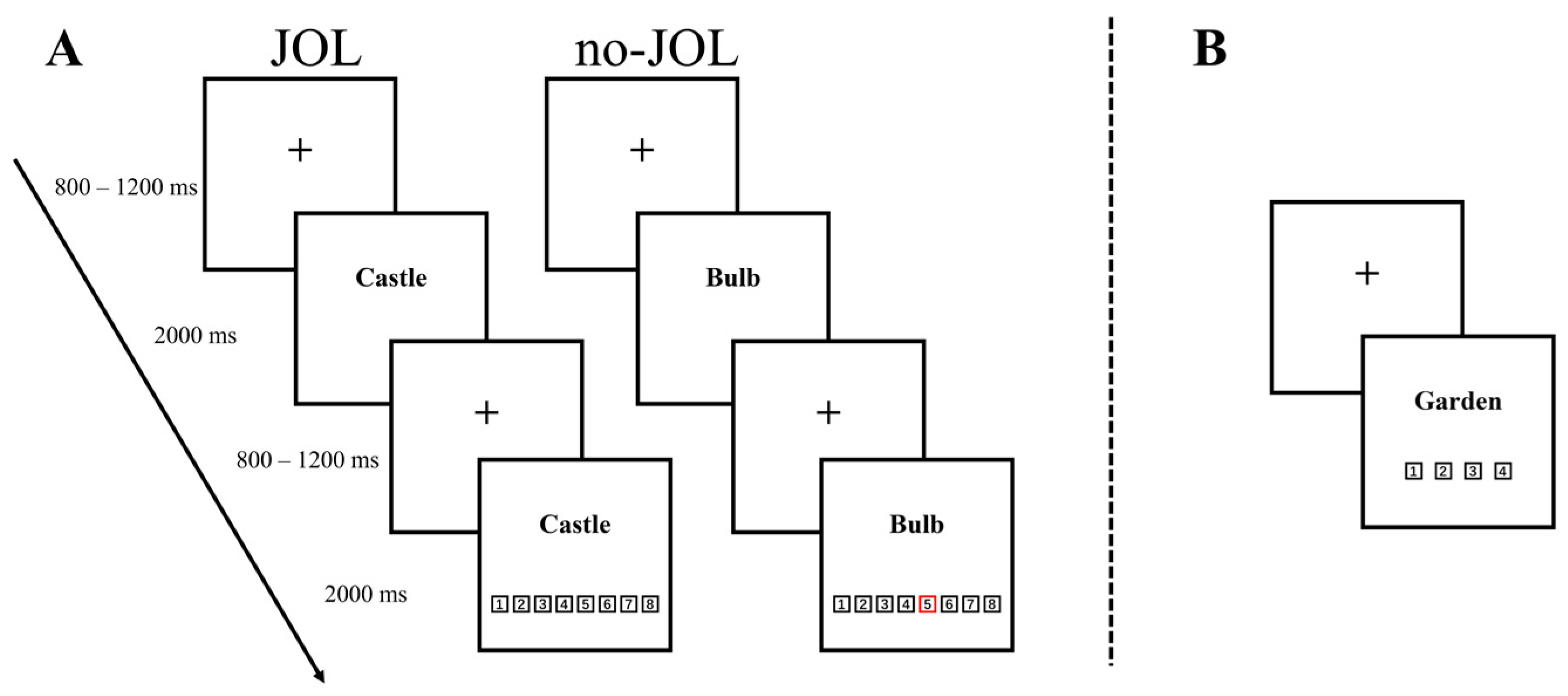
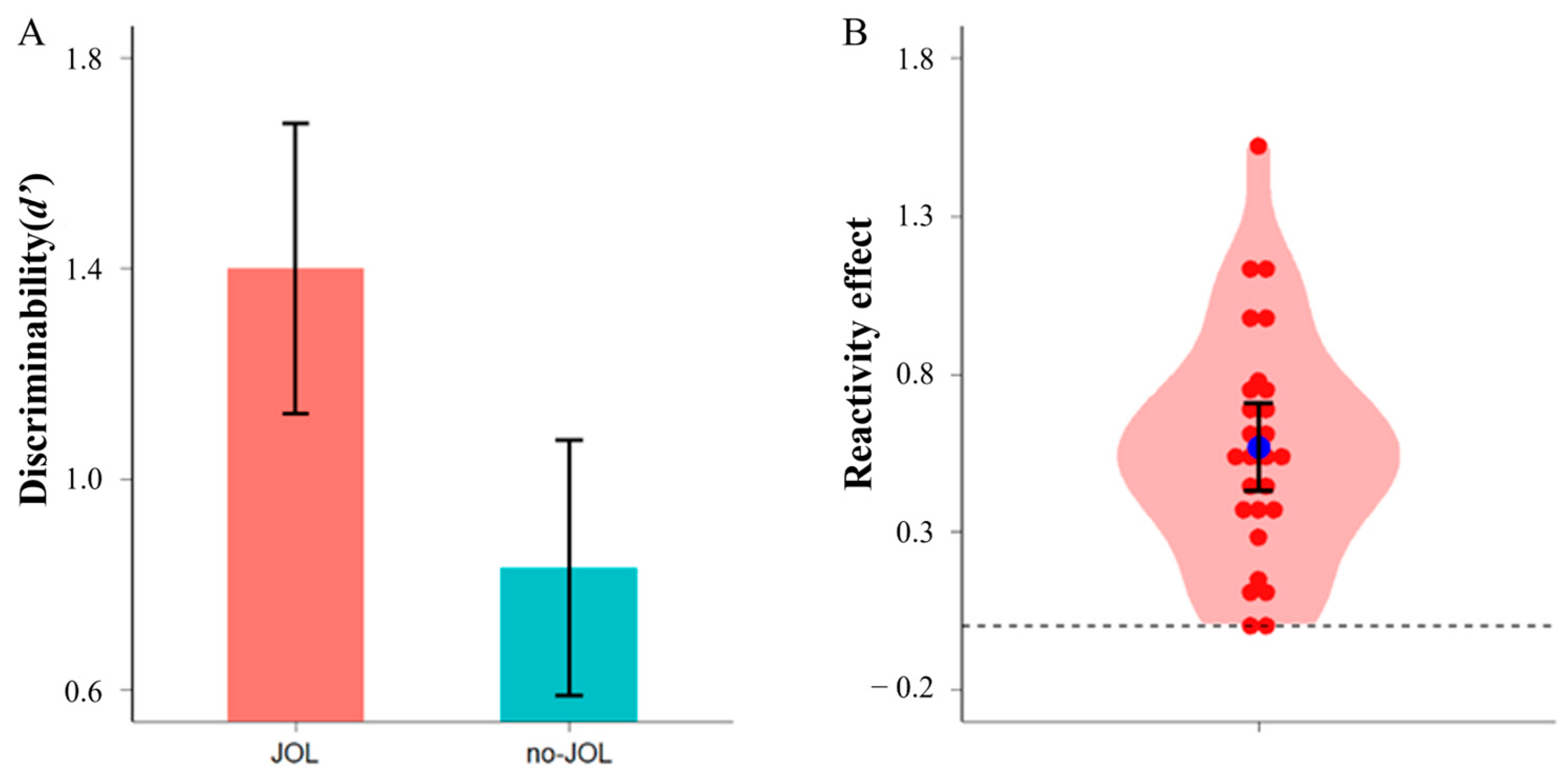
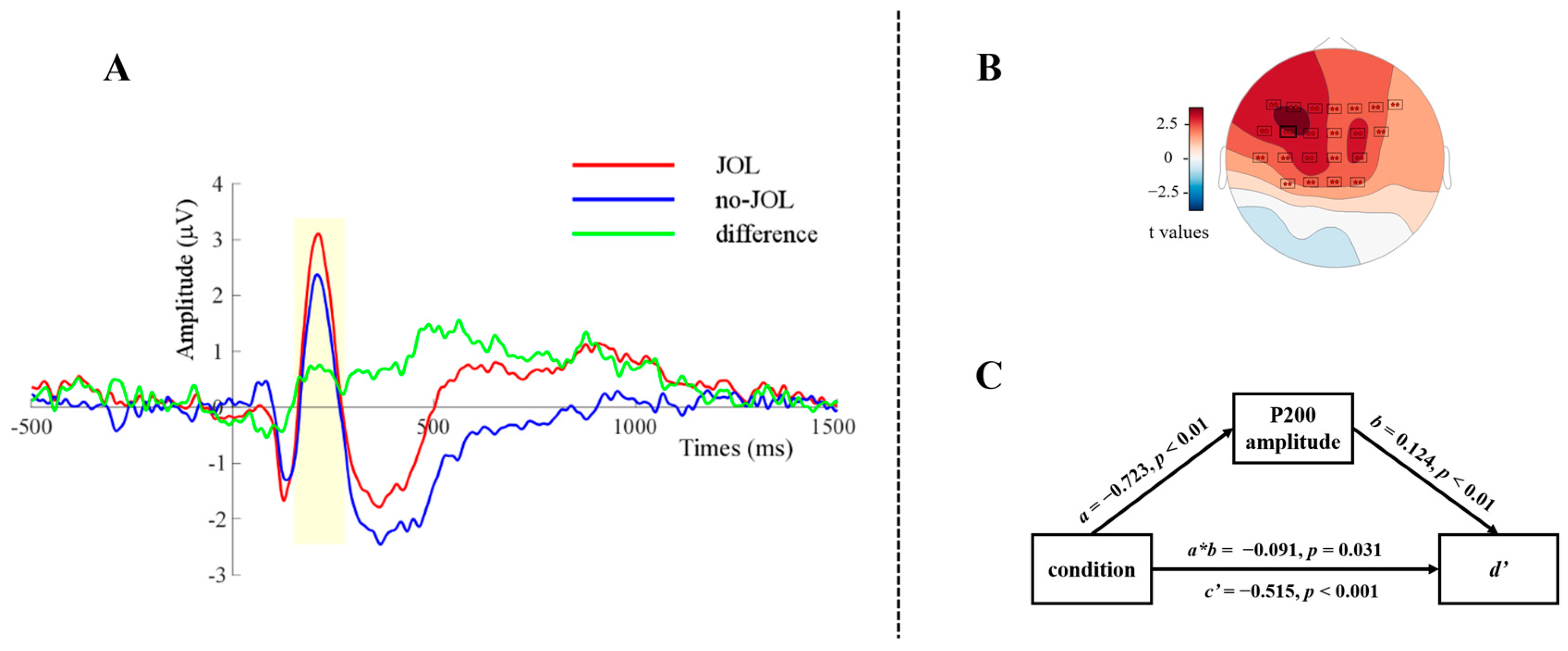
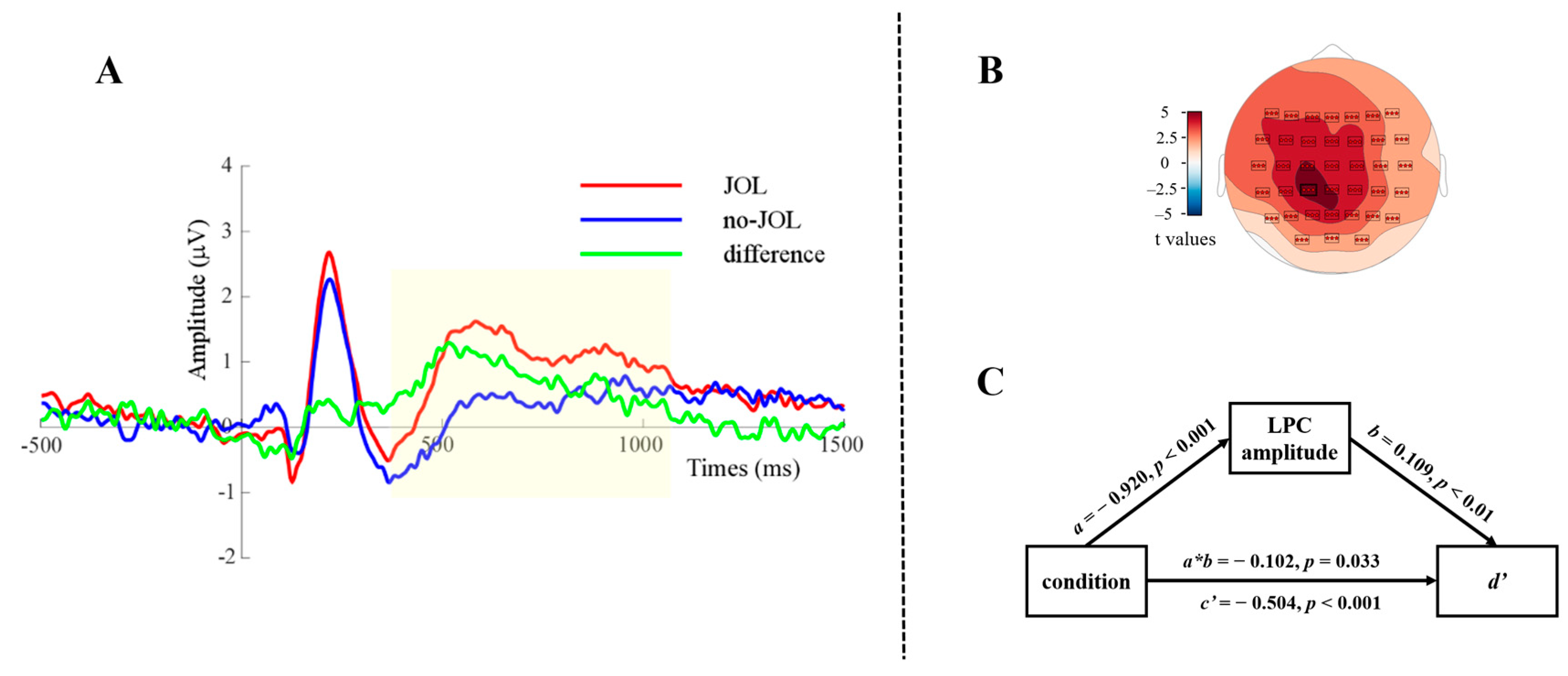
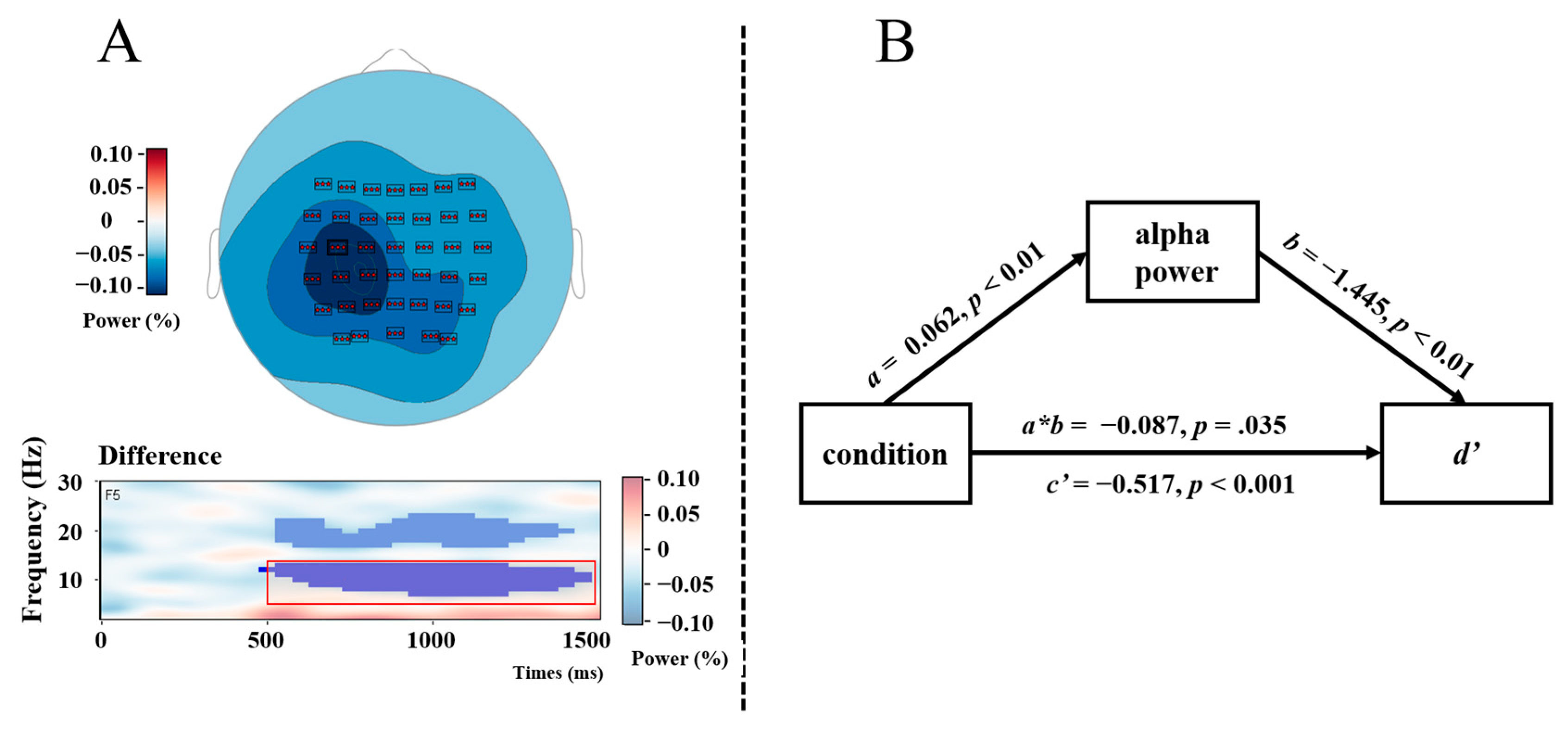
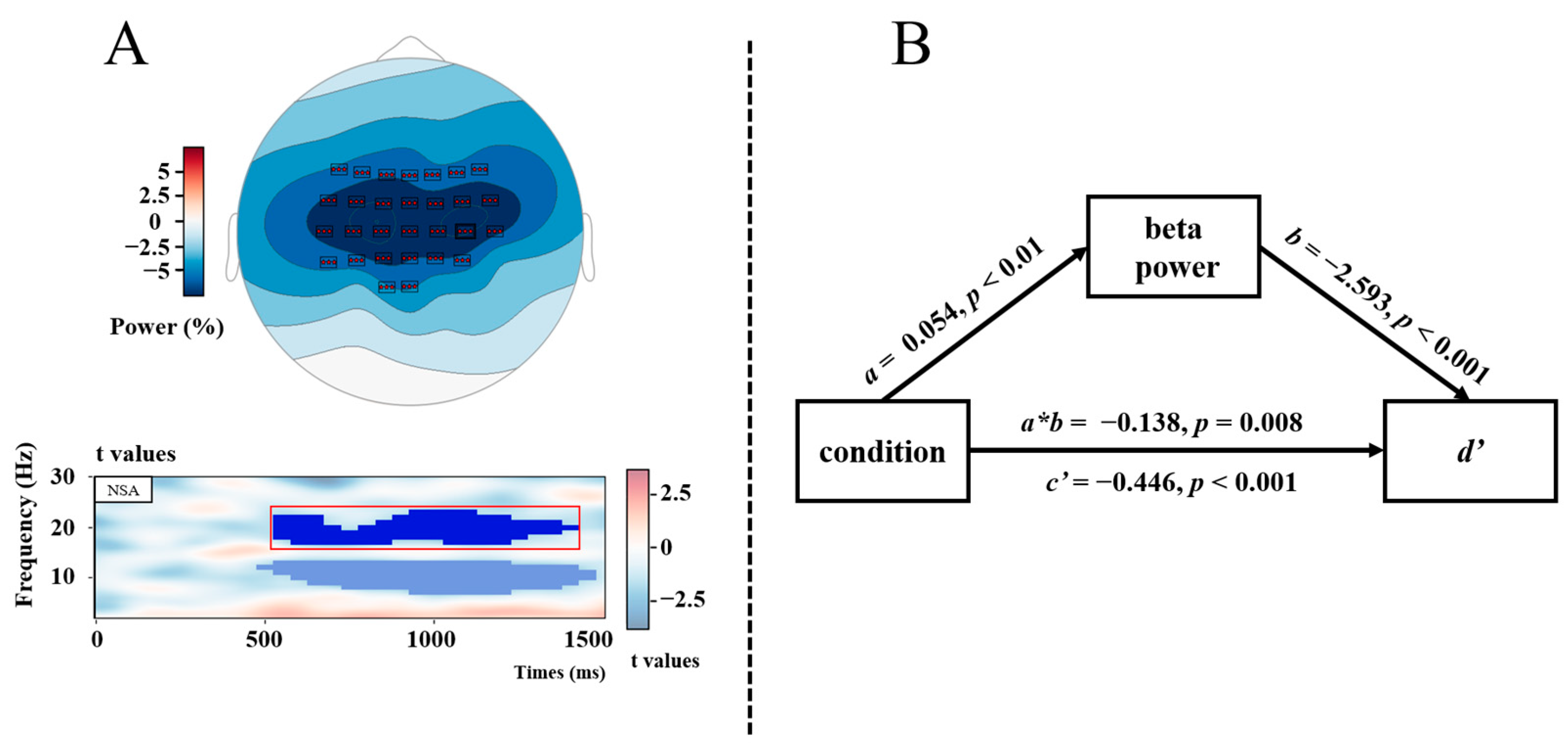
Disclaimer/Publisher’s Note: The statements, opinions and data contained in all publications are solely those of the individual author(s) and contributor(s) and not of MDPI and/or the editor(s). MDPI and/or the editor(s) disclaim responsibility for any injury to people or property resulting from any ideas, methods, instructions or products referred to in the content. |
© 2024 by the authors. Licensee MDPI, Basel, Switzerland. This article is an open access article distributed under the terms and conditions of the Creative Commons Attribution (CC BY) license (https://creativecommons.org/licenses/by/4.0/).
Share and Cite
Li, B.; Pastötter, B.; Zhong, Y.; Su, N.; Huang, T.; Zhao, W.; Hu, X.; Luo, L.; Yang, C. Judgments of Learning Reactively Improve Memory by Enhancing Learning Engagement and Inducing Elaborative Processing: Evidence from an EEG Study. J. Intell. 2024, 12, 44. https://doi.org/10.3390/jintelligence12040044
Li B, Pastötter B, Zhong Y, Su N, Huang T, Zhao W, Hu X, Luo L, Yang C. Judgments of Learning Reactively Improve Memory by Enhancing Learning Engagement and Inducing Elaborative Processing: Evidence from an EEG Study. Journal of Intelligence. 2024; 12(4):44. https://doi.org/10.3390/jintelligence12040044
Chicago/Turabian StyleLi, Baike, Bernhard Pastötter, Yongen Zhong, Ningxin Su, Ting Huang, Wenbo Zhao, Xiao Hu, Liang Luo, and Chunliang Yang. 2024. "Judgments of Learning Reactively Improve Memory by Enhancing Learning Engagement and Inducing Elaborative Processing: Evidence from an EEG Study" Journal of Intelligence 12, no. 4: 44. https://doi.org/10.3390/jintelligence12040044
APA StyleLi, B., Pastötter, B., Zhong, Y., Su, N., Huang, T., Zhao, W., Hu, X., Luo, L., & Yang, C. (2024). Judgments of Learning Reactively Improve Memory by Enhancing Learning Engagement and Inducing Elaborative Processing: Evidence from an EEG Study. Journal of Intelligence, 12(4), 44. https://doi.org/10.3390/jintelligence12040044





